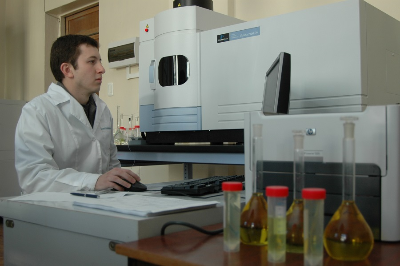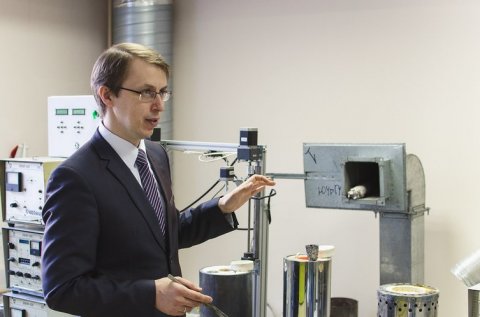It is impossible to imagine our life without the materials that people produce and process for their living activities. It is interesting that early civilizations were even identified by the names of materials that people learned to use: the Stone Age, the Bronze Age, and the Iron Age. Over time people have learned to produce materials superior in properties to natural products. Now there are tens of thousands of different materials with very specific properties. The improvement of the operational properties of materials, as well as obtaining new ones, is necessary for the development of almost all sectors of the economy. In the long-term forecast of the scientific and technological development of Russia until 2030, approved by the Government of the Russian Federation, one of the six priority fields for the development of the economy of our country are new materials and nanotechnology.
The problems related to the production and development of new materials, methods of their processing are solved by Materials Science, that is the science of the relationships between the composition, structure and properties of materials and the laws of their changes under external influences.
Basic Fields of Materials Science Development
At present, the key fields of development of Materials Science are the following:
- additive technologies: it is a layer-by-layer build-up and synthesis of an object using computer 3D technologies;
- nanotechnology: methods of production and use of artificially created objects of a nanometre size (1 nm = 10-9 m);
- computer modelling of the structure and composition: the development of mathematical models that determine the relationship “composition – technology – properties”;
- system analysis of multifactorial effects: a set of methods and tools used in the study and design of complex objects, based on the use of computer technology;
- “green” technologies that allow replacing hazardous industries with safe ones, protecting the atmosphere, soil, fresh water and the oceans from pollution, and eliminating the generation of toxic waste.
The SUSU Department of Materials Science, Physical and Chemical Properties of Materials trains Bachelor’s degree students in the field of 22.03.01 Materials Science and Technology.
During the 4 years of study, Bachelor’s degree students receive quality basic training in the fields of natural sciences and mathematics, including computer sciences, and also master the methods and techniques of creating and studying new materials. Bachelor’s degree students also study measures to ensure the environmental and technical safety of developed materials, equipment and technologies.
From the first year of study, the most successful and ambitious students are involved into research projects. Together with the staff of the Department of Materials Science, Physical and Chemical Properties of Materials they participate in scientific conferences, and publish articles in collections of scientific papers. In addition, the most active students have publications in highly rated foreign periodicals, which give them an opportunity to apply for increased scholarships.
Equipment
The Department has laboratories fitted with modern experimental and research equipment: electron microscopy, X-ray diffractometry, thermal analysis, crystal chemistry of single crystals, atomic emission spectroscopy, physical modelling and thermomechanical tests (Gleeble-3800).
_photo-resizer_ru.jpg)
Photo: Electron microscopy

Photo: X-ray diffractometer

Photo: Thermal analysis device

Photo: Atomic emission spectroscope
The following documents should be submitted to the Admissions Committee:
- Certificate of Complete Secondary or Secondary Specialized Education;
- Unified State Exam results (specialized Mathematics, Russian Language, Physics).
In the field of 03.22.01 "Materials Science and Technology" (Bachelor’s degree programme) there are 20 state-financed places, the duration of training is 4 years. Tuition is also possible on a contract basis; the cost of training is 150,700 roubles per year.
Graduates in the field of “Materials Science and Technology” can work in research institutes, laboratories and scientific divisions of metallurgical, chemical, engineering and mining enterprises. They will have to invent, model and create new materials for a wide variety of designs and functional applications, the substances these materials will consist of, as well as modern methods of manufacturing materials, their processing, studying their properties and structure, identifying defects in materials that occur during their operation. They will develop smart composites, polymers, chip crystals, alloys, steels, glass, ceramics and other materials with unusual but necessary properties to make new materials more functional, high-quality, environmentally friendly, easy to manufacture, cheap and affordable.
Bachelor’s degree graduates can continue their studies at the SUSU Master’s degree programme in the field of 22.04.01 "Materials Science and Technology: Structure and Properties of Materials" (10 state-financed places), the duration of study is two years.
The qualification assigned is Master in "Materials Science and Technology". The training is possible on a contract basis.
International Cooperation
To cooperate with foreign companies, an international cooperation program is being developed with Zhengzhou University of Aeronautics (Henan Province in China) in the field of Materials Science and Technology. The study is planned according to a certain schedule at two universities both at SUSU and Zhengzhou University of Aeronautics on a joint curriculum, and students receive double degree diplomas.
Students’ Successes
Students successfully participate in the Russian Olympiads in Materials Science; in the team solution of complex tasks related to the selection of the necessary material for specific, and as a rule, extreme conditions, its producing, processing, and economic calculation of the necessary costs. For several years in a row these students have been winning prizes in student intra-university and national competitions held in Chelyabinsk, Krasnoyarsk and St. Petersburg.




